Alice's upbeat YES campaign for marriage equality
21 September 2017
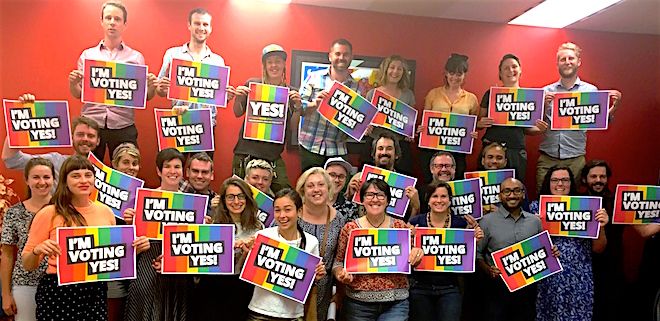
Above: The local YES campaign kicked off after the openly gay Member for Namatjira Chansey Paech called for a meeting in his office last Wednesday.
By KIERAN FINNANE
They may lament the waste of public funds on the Australian Government’s non-binding same sex marriage postal survey, but nonetheless they are throwing themselves into campaigning for YES. Maya Newell and Dane Brookes, two members of the local campaign, are confident of a strong YES vote from Alice Springs as long as people make sure to complete and post their form.
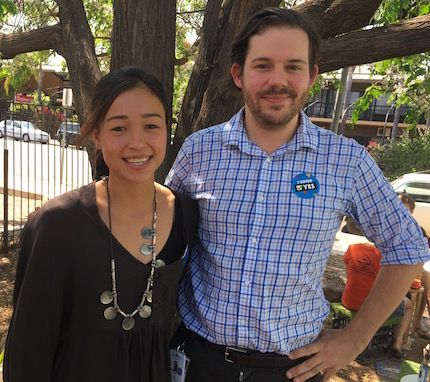 They are just as inspired though by the way the campaign has brought their community and supporters together and the opportunity it offers for a strong message of community acceptance to be transmitted to young people that it is OK to be lesbian, gay, bisexual, transgender, queer or questioning, and intersex (LGBTQI+). To this terminology they add “sistagirls and brotherboys” to fully embrace the diversity of gender and sexuality in the NT.
They are just as inspired though by the way the campaign has brought their community and supporters together and the opportunity it offers for a strong message of community acceptance to be transmitted to young people that it is OK to be lesbian, gay, bisexual, transgender, queer or questioning, and intersex (LGBTQI+). To this terminology they add “sistagirls and brotherboys” to fully embrace the diversity of gender and sexuality in the NT.
Right: Maya Newell and Dane Brookes.
Reception from passers-by at the Sunday markets had none of the toxicity that is creeping into sections of the national debate, says Dr Brookes, a medical doctor at the Alice Springs Hospital. In fact, thus far there is not a strong NO campaign locally although he recognises that the town is “a melting pot and there’ll definitely be some who vote NO”.
Lots of people at the markets were happy to have conversations and that’s the way the local YES campaign wants to work, says Ms Newell, a film-maker notably of the feature-length documentary Gayby Baby, in which children of same sex couples tell their stories.
“We want open conversations,” says Ms Newell, “where there’s space to ask any questions you might have and where it’s OK to not be ready to support change.”
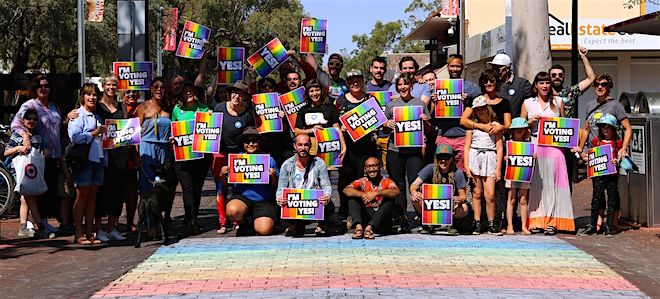
Above: The YES campaigners chalked up a rainbow, the international symbol of gay pride, at last Sunday’s markets.
She relates a conversation she had at the markets with a husband and wife: the wife was ready to vote YES, the husband not: “It was lovely to work through the conversation with him to find the things we did agree on.”
One of these was that change is inevitable – if not right now, eventually, going the way of other liberal democracies. They also shared frustration over the expenditure of $122m on the postal survey, which could have gone to addressing more pressing needs (Ms Newell mentions Aboriginal disadvantage, Dr Brookes, health care).
In the end the husband said he would be voting YES, if only to ensure that not more taxpayers’ money gets spent on this issue.
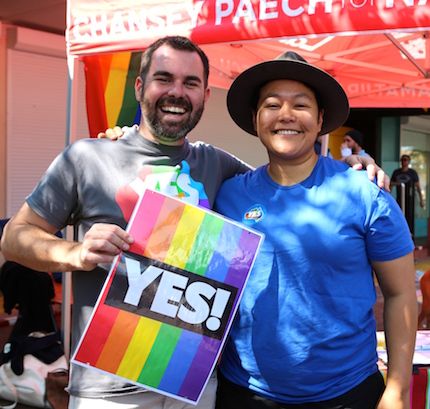 In the local conversations “we also do a lot of directing back to the issue, which is about two people who love each other being able to marry,” says Dr Brookes. “It’s not about the children of same sex couples or the Safe Schools Program. A YES vote won’t affect the formation of families with same sex parents – that’s happening anyway.”
In the local conversations “we also do a lot of directing back to the issue, which is about two people who love each other being able to marry,” says Dr Brookes. “It’s not about the children of same sex couples or the Safe Schools Program. A YES vote won’t affect the formation of families with same sex parents – that’s happening anyway.”
Left: MLA Chansey Paech with singer-songwriter Camille Bernadino at the Sunday markets, where Mr Paech turned over his stall to the YES campaign.
The effect on children of having same sex parents is nonetheless constantly raised in the debate and the campaigners don’t decline to go there. Indeed, Dr Brookes says they can thank the NO campaign for allowing them to advocate on the broader issues and the research evidence is that children of same sex couples are no worse off than children of heterosexual couples.(See footnotes.)
“They actually do better,” cuts in Ms Newell, laughing. “They score higher in the areas of social and emotional well-being – not to boast or anything.”
This is her own life experience – she was raised by a lesbian couple, who are still together after 34 years. She is close to all her uncles and her grandparents and the many male friends of her family. She knows her biological father and has a good relationship with him. She says most children of same sex couples are actually raised in co-parenting situations, where they know their biological parents.
Dr Brookes, acknowledging his present juniority in the medical profession, does not try to speak as an expert but he points to the significant mental health burden on young LGBTQI+ people arising from prejudice against them: they are five times more likely to commit suicide, much more likely to experience bullying and abuse as well as depression and anxiety caused by social stigma.
If it were only for these young people’s sake, many would want to vote YES, but the success of the campaign will have an impact well beyond them and the whole LGBTQI+ community, says Ms Newell: Most Australians would be hard-pressed to not know someone in this community and a YES vote will also mean a lot to them. It will mean a lot to the parents who want to attend their gay son’s wedding, to the person whose best friend may want to come out or be accepted, to the children of now and the future, whether LGBTQI+ or of same sex parents, who should enjoy equality as their fundamental right.
Below: Emma Frank (left) and Keren Shlezinger with little helper, working on the Todd Mall rainbow.
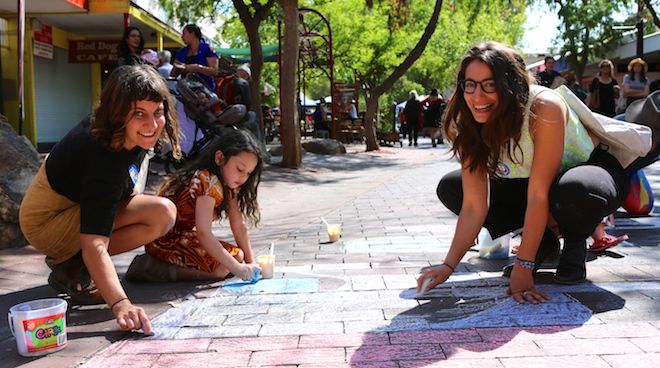
To get in touch with the campaign, you can email: CentralAustraliaYes@gmail.com
_________________
FOOTNOTES:
We identified 79 scholarly studies that met our criteria for adding to knowledge about the wellbeing of children with gay or lesbian parents. Of those studies, 75 concluded that children of gay or lesbian parents fare no worse than other children. While many of the sample sizes were small, and some studies lacked a control group, researchers regard such studies as providing the best available knowledge about child adjustment, and do not view large, representative samples as essential.
We identified four studies concluding that children of gay or lesbian parents face added disadvantages. Since all four took their samples from children who endured family break-ups, a cohort known to face added risks, these studies have been criticized by many scholars as unreliable assessments of the wellbeing of LGB-headed households. Taken together, this research forms an overwhelming scholarly consensus, based on over three decades of peer-reviewed research, that having a gay or lesbian parent does not harm children.
These are some of the key messages of a literature review of research on same-sex parented families published by The Australian Institute of Family Studies, Melbourne, Vic:
- About 11% of Australian gay men and 33% of lesbians have children. Children may have been conceived in the context of previous heterosexual relationships, or raised from birth by a co-parenting gay or lesbian couple or single parent.
- Overall, research to date considerably challenges the point of view that same-sex parented families are harmful to children. Children in such families do as well emotionally, socially and educationally as their peers from heterosexual couple families.
- Some researchers have concluded there are benefits for children raised by lesbian couples in that they experience higher quality parenting, sons display greater gender flexibility, and sons and daughter display more open-mindedness towards sexual, gender and family diversity.
- The possible effect of important socio-economic family factors, such as income and parental education, were not always considered in the studies reviewed in this paper.



Ms Finnane has done one side of the journalistic due diligence exercise seeking out and interviewing Yes lobbyists in depth.
Will Ms Finnane be completing the full circle of the due diligence exercise by seeking out and interviewing No supporters? (ahem) Yes? No? (So to speak). I look forward to it with interest.
@John Bell. Alice Springs News Online’s editorial focus is always on the local picture. The YES campaign in Alice Springs is active and highly visible. There has been no contact to this office from anybody representing a local NO campaign.
It is possible that a NO case may be made by some local religious groups. We have contacted Pastor Jamie Tasker, who chairs the Alice Springs Christian Ministers Association, requesting a statement, if and when one is made.
I think that the no side actually doesn’t have a single rational argument. Religious institutions will still have the rights to discriminate if they wish to. But our government and legal system should stand for equal rights for all.
I do not think that the “No”voices are only for religious groups. I believe they keep quiet not to be picked on by the “Yes” bullies who assume that everybody must agree with them: “Shame on you, you are not for equality”. Businesses advertised their support for Yes, should the No boycott them?
Same sex marriage for true love sure but why not for bigamy? One can truly love more than one person. I voted No, not because of the same sex, but because I am against marriage all together. In my eyes unless it is for religious beliefs marriage is an outmoded institution. De Facto is the way.
What is a de facto relationship?
“A de facto relationship is defined in Section 4AA of the Family Law Act 1975. The law requires that you and your former partner, who may be of the same or opposite sex, had a relationship as a couple living together on a genuine domestic basis.”
This issue has a scope way beyond individual opinion and preference. It is about others – their right to make a choice and access the benefits afforded by marriage. This is about civil rights. Whatever I think about marriage is not the point. It’s time for a shake up of an old and rather entrenched institution, so that it can offer the best it can offer to all Australians – not just some. Am I crazy to think that marriage is about love between two people? Seems very simple and straightforward to me. Of course I will vote yes.
@Evelyne Roullet. You raise some good points in your reasons for ‘No’ voters not coming out of the woodwork in Alice. You make an excellent observation that outside those of religious faiths, marriage has been devalued and has lost much of its meaning in the hetero secular community in favour of de facto family situations. Centrelink and other agencies provide similar benefits, while gay couples with kids get similar financial entitlements. There can be no doubt that there are still, however, large silent numbers of agnostic or atheistic non-religious secular Alicians who hold marriage in the same light as their religious fellow citizens. In a small town like Alice they keep their views to themselves and the survey envelope for fear of backlash in their social and business lives in the current environment. It would be good if some of these Alicians would be game enough to articulate their ‘No’ arguments.
I would like to see the debate go beyond the highly charged emotive to the clearheaded discussion on the intention of the Constitution and peoples’ voice questions of referendum v postal survey, the jurisdictional separation of powers in any change to the Marriage Act, the parliament’s so-called ‘conscience vote’ and the ramifications of legal case precedent such as the decision in Hyde v Hyde etc. This would make any subsequent change or staus quo of the Marriage Act a much more credible exercise of due diligence that would stand the credibilty test of scrutiny by future generations. Are there any Alicians out there who are prepared to stand up to public scrutiny I wonder? I hope there are.
They should have the opportunity to be as miserable as other married folk.
These people have made their choice to be different so have the guts to be different.
Already homosexuals lack the fortitude to do this as in the hijacking of the word gay and dreaming up titles like LGBTQI.
Remember, your rights end where another person’s rights begin.
Belonging to the Under Represented Biological Normal Persons Group (URBNPG) I cannot see my way clear to voting yes.
For a view from some Aboriginal people (and a couple non-Aboriginal) who are voting NO, go to http://www.cavoteno.com.
R. Henry: At what age did you make the conscious decision that you would be attracted to the opposite sex? Homosexuality is not a conscious decision, but a biological one – exactly the same one that made you attracted to the opposite gender.
I’m saddened the local No voters are not organised to encourage those that agree with them to ensure their vote is posted. Based on public social media they are anything but keeping silent or keeping their views to themselves.
De facto sounds awesome, until the law comes in. There are a number of cracks in this legislation that leave people vulnerable, so it does need to be strengthened and improved.
If marriage is to be restricted to just a man and a woman and everyone else can have something else, maybe we could restrict income tax to between a white straight man or woman and we could call it something else for the homosexuals and they could pay considerably less, considering they don’t deserve equal rights. Sounds incredible fair to me.
Peter Jobson, I did not have to make a decision of any sort as that is what being normal means, being attracted to the opposite sex. It is the way nature made us.
Some people do have a hormone imbalance for their physical sexual makeup but I have seen very effeminate males father children, also women who are very mannish, even to growing a beard, who married and enjoyed the role of motherhood.
Some are born not developed for either role and many of them can and are helped surgically. A lot are simply pleasure searchers who believe in any thing goes.
I know a lot of people who are in a homosexual relationship with one permanent partner who are, like any couple with the right partner, secure enough to not want or need more.
To all who are demanding equal rights I ask why an Australian women earn 23% less than men, according to workplace equality scorecard? This is out of context? Maybe not.
As we ask same rights for sexual life, we should demand same rights for working life.
PS: I would like to ask why two married homosexuals should earn more than two married lesbians if they doing the same work?
R Henry: Thank Goodness you aren’t a medical practitioner because your argument harks back to the 1950s and 60s.
It’s lovely that you have an opinion, but it might be best that you stick to giving an opinion to what you do truly know – and that obviously isn’t the current research in gender studies. Surgery to remove homosexuality is such a draconian method.
Evelyne Roullet: Hear! Hear! Now that is a referendum I would vote YES to if asked: Should women receive equal pay to men for all paid positions?
Peter Jobson. So, Peter, you have not heard of people who have, by their own request, had sex change operations?
“Love is Love” is such an appealing, feel-good yet trite simplification of the far broader issues of human rights that extend way beyond the right of same-sex couples to marry.
But this is our modern “education” system at work: the inability for many to analyse more complex issues.
The implications of changing an institution (marriage) that extends across all cultures, religions and is almost as old as society itself, seems entirely lost on many in the West.
“The sky hasn’t fallen in” is such a common response by those (including if I recall correctly our own PM), that ignores notable losses in rights for those beyond immediate church marriage practitioners who seem likely to find exemption from prosectution under protection legislation.
Marriage has been politicised by its feminist opponents (ironically predominantly I feel certain now in the “Yes” camp) for its role in asset maintenance as opposed to the role of the protection of children resulting from procreation within traditional marriage.
The campaign has failed to honestly analyse the primary purposes of marriage that extend beyond the rights of the couple themselves.
Yet all the emphasis is focussed simply on the rights of (any) two people who love one another.
So what drives the populist rainbow flag waving “Yes” campaigners to ensure that every possible supporter casts their optional vote?
Memory of Brexit I suspect is driving the die-hards out of the cafes and campuses.
If the vote for this cohort was via their “smart” phones the result would surely be a lay down misère. But putting aside the “smart” phone on-line world for the physical world involves a huge privation.
The challenge is registering to vote; tracking down the survey to their nominated mailing address; and finding their way to a post box.
These seem such daunting problems that “Yes” voters seem to require great assistance, encouragement and “permission” (of the majority within their cohort) to cast and submit a valid “Yes” vote.
Pity there wasn’t an answer that said equality in marriage is equality in suffering.